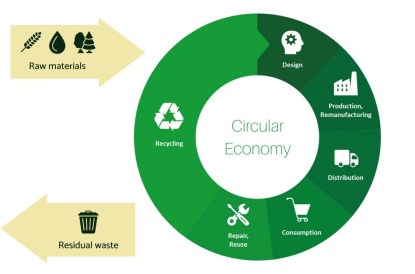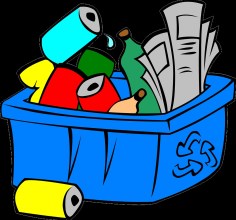Investing in the circular economy
ITM’s Andy Homden talks to Jeremy Bacon of Riverdale Paper PLC ito find out more about the vital role that private enterprise plays in the circular economy.
Riverdale Paper and the circular economy
Andy: Jeremy, thank you very much for talking to us. First of all, can you tell me what your company does.

Jeremy: Riverdale Paper is an independent recycling company, based in Gateshead, Tyne & Wear. The company collects and processes a wide variety of production wastes, adding value through sorting, shredding and baling these resources before transferring to recyclers in the UK and overseas and back into useful production. As such, it is a critical part of the supply chain which supports the shift from a linear to a circular economy.

Andy: How would you define ‘Circular Economy?’
Jeremy: From our perspective, it is a kind of thoughtful recycling. You prepare and sort out material so it can be used again in a product that can, in turn, be recycled again . . . and again. That doesn’t always happen with simple recycling. We try to make sure that the material we prepare can be used as many times as possible so that ‘virgin material’ does not have to be used in the manufacture of a new product.

Riverdale’s recycling plants
Andy: Could you describe where you do it and what happens there? What are the inputs and outputs?
Jeremy: Riverdale’s facilities are located in Gateshead and Co. Durham in the North East of England.
Both locations collect and process a wide range of recyclable materials, including cardboard, paper, wood, hard plastics and plastic film. Residual waste which cannot be recycled is bulk loaded for transfer to ‘thermal recovery’ facilities, where it is used to generate electricity. So – very little material if any goes to landfill. In an ideal world you would not burn anything to generate electricity – but at least by burning this material, you do not have to burn fossil fuel.
The company also provides confidential shredding services to public and private sector customers – Riverdale is a founding member of the UK Security Shredding Association, a trade organisation which sets standards for physical data destruction to ensure compliance with UK GDPR and the Data Protection Act 2018. The process of confidential shredding therefore both ensures data security for our customers, and releases paper fibre back into the production system via pulping at UK papermills.
The good news about recycling
Andy: What would you like people to know about your industry that would make effective recycling easier and more cost effective?
Jeremy: First of all, the materials collected in recycling bins at the kerbside really do go to recycling plants for sorting, and that the vast majority of these materials (paper, card, plastics, steel, aluminium etc.) are recycled and put back into useful production. This is often not communicated clearly enough through the media. Recycling therefore counts!
Cross-contamination

We also would like people to understand the problem of ‘cross-contamination’.
This involves two main problems:
- Household materials are often contaminated with other waste that make them more difficult to recycle. Plastic or cardboard food containers should, ideally, be rinsed and clean when put in a mixed recycling bin.
- It really helps when collecting from larger organisations like businesses or schools, that different types of waste are segregated before collection or delivery. Again this maximises the potential for long term recycling in a ‘circular’ fashion.
Recycling champions in schools and businesses
We would also strongly recommend that schools and businesses appoint a ‘champion’ or ‘ambassador’ for recycling.
Andy: What do you mean by that?
Jeremy: Recycling is not the main purpose of a school or indeed of most businesses. However, if recycling is going to make big advances and to drive change, someone in these organisations should be speaking up about how to maximise the recycling effort. In effect, the environment has to be effectively represented at Board and Senior Leadership Team level, while also presenting the case of what to do more widely amongst, staff, and in the case of a school, amongst students as well. Organisations like schools need to undergo a cultural change so that recycling becomes part of everyday life for everyone, rather than something ‘special’.
Profits and investment
Andy: Why is it important that a company like yours is profitable?
Jeremy: First, of course, all businesses need to make a profit – otherwise they cannot continue to do what they do. Quite apart from that, there is the issue of investment and reinvestment. New technology is making recycling more and more efficient, but the capital investment needed for this is huge. A great deal of our profits are invested in infrastructure and equipment to improve operational efficiency and customer services. This also enables us to diversify as necessary to navigate future market and legislative changes.
How schools can be more effective recyclers
Andy: What do you think schools might do to contribute to more effective waste management and recycling?
Jeremy: Communication is critical. As I have said, appointing and empowering environmental ‘champions’ who can identify relevant environmental improvements across different school departments and activities could make such a difference, It would also be hugely beneficial if this individual or individual could report to the Governing Body – this will really help drive change.
 Of course we would like to see sustainability in general and recycling in particular in the curriculum. You can hardly put a value on the efforts made to teach students about recycling and its benefits in terms of mitigating climate change and supporting the circular economy. Without this, recycling just cannot ‘go mainstream’.
Of course we would like to see sustainability in general and recycling in particular in the curriculum. You can hardly put a value on the efforts made to teach students about recycling and its benefits in terms of mitigating climate change and supporting the circular economy. Without this, recycling just cannot ‘go mainstream’.
Without putting sustainability at the centre of cultural change, bad practices in schools, at home, and then at university or in employment, will not be recognised and good practice (e.g. providing recycling points for drinks containers, paper and cardboard and labelling these clearly for pupils, staff and visitors) will not be encouraged.
At Senior Leadership and Board level, schools should also challenge the wider status quo: they can and must highlight areas of concern in terms of environmental performance , or the potential cost-effectiveness of the services provided, or in the local community.
Setting up direct contact with your local waste / recycling provider and providing information about the school’s priorities and expectations in terms of performance, will help the school to deliver on its environmental objectives. Talking to their school cleaning service (if outsourced) about the school’s goals for recycling would also be a great starting point.
Use the data!
And finally, schools might think about accessing data from their waste / recycling provider regarding the amount and type of materials collected and the downstream use of those materials, so this can be fed back to all relevant stakeholders, especially the students. This data can also inform the school’s strategy to improve recycling and environmental performance.
Andy: Jeremy, thank you so much!
Jeremy: A pleasure!
 Jeremy Bacon, Business Development Manager at Riversdale Paper was talking to ITM editor, Andy Homden.
Jeremy Bacon, Business Development Manager at Riversdale Paper was talking to ITM editor, Andy Homden.
Contact Info – Jeremy’s Profile linkedin.com/in/jeremy-bacon-16502228
FEATURE IMAGE: by Michael Jin on Unsplash
Support Images: Thank you to Jeremy and Riverdale Paper and to OpenClipart-Vectors from Pixabay & Moondance from Pixabay

